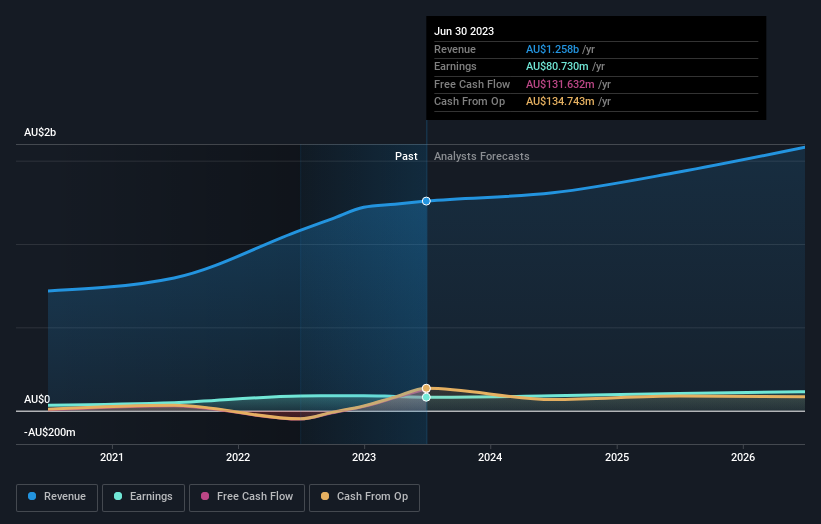With 59% ownership, Redox Limited (ASX:RDX) insiders have a lot at stake
Key Insights
Insiders appear to have a vested interest in Redox's growth, as seen by their sizeable ownership
A total of 3 investors have a majority stake in the company with 65% ownership
Past performance of a company along with ownership data serve to give a strong idea about prospects for a business
To get a sense of who is truly in control of Redox Limited (ASX:RDX), it is important to understand the ownership structure of the business. We can see that individual insiders own the lion's share in the company with 59% ownership. In other words, the group stands to gain the most (or lose the most) from their investment into the company.
So, insiders of Redox have a lot at stake and every decision they make on the company’s future is important to them from a financial point of view.
In the chart below, we zoom in on the different ownership groups of Redox.
See our latest analysis for Redox
What Does The Lack Of Institutional Ownership Tell Us About Redox?
We don't tend to see institutional investors holding stock of companies that are very risky, thinly traded, or very small. Though we do sometimes see large companies without institutions on the register, it's not particularly common.
There could be various reasons why no institutions own shares in a company. Typically, small, newly listed companies don't attract much attention from fund managers, because it would not be possible for large fund managers to build a meaningful position in the company. It is also possible that fund managers don't own the stock because they aren't convinced it will perform well. Redox's earnings and revenue track record (below) may not be compelling to institutional investors -- or they simply might not have looked at the business closely.
Redox is not owned by hedge funds. Our data shows that Estate Of Silvia Coneliano is the largest shareholder with 26% of shares outstanding. Robert Coneliano is the second largest shareholder owning 23% of common stock, and Renato Coneliano holds about 15% of the company stock. Renato Coneliano, who is the third-largest shareholder, also happens to hold the title of Member of the Board of Directors. In addition, we found that Raimond Coneliano, the CEO has 2.3% of the shares allocated to their name.
After doing some more digging, we found that the top 3 shareholders collectively control more than half of the company's shares, implying that they have considerable power to influence the company's decisions.
Researching institutional ownership is a good way to gauge and filter a stock's expected performance. The same can be achieved by studying analyst sentiments. While there is some analyst coverage, the company is probably not widely covered. So it could gain more attention, down the track.
Insider Ownership Of Redox
The definition of an insider can differ slightly between different countries, but members of the board of directors always count. Management ultimately answers to the board. However, it is not uncommon for managers to be executive board members, especially if they are a founder or the CEO.
Most consider insider ownership a positive because it can indicate the board is well aligned with other shareholders. However, on some occasions too much power is concentrated within this group.
It seems that insiders own more than half the Redox Limited stock. This gives them a lot of power. Given it has a market cap of AU$1.2b, that means they have AU$701m worth of shares. It is good to see this level of investment. You can check here to see if those insiders have been buying recently.
General Public Ownership
The general public, who are usually individual investors, hold a 14% stake in Redox. While this size of ownership may not be enough to sway a policy decision in their favour, they can still make a collective impact on company policies.
Private Company Ownership
Our data indicates that Private Companies hold 26%, of the company's shares. It's hard to draw any conclusions from this fact alone, so its worth looking into who owns those private companies. Sometimes insiders or other related parties have an interest in shares in a public company through a separate private company.
Next Steps:
While it is well worth considering the different groups that own a company, there are other factors that are even more important. To that end, you should be aware of the 1 warning sign we've spotted with Redox .
If you would prefer discover what analysts are predicting in terms of future growth, do not miss this free report on analyst forecasts.
NB: Figures in this article are calculated using data from the last twelve months, which refer to the 12-month period ending on the last date of the month the financial statement is dated. This may not be consistent with full year annual report figures.
Have feedback on this article? Concerned about the content? Get in touch with us directly. Alternatively, email editorial-team (at) simplywallst.com.
This article by Simply Wall St is general in nature. We provide commentary based on historical data and analyst forecasts only using an unbiased methodology and our articles are not intended to be financial advice. It does not constitute a recommendation to buy or sell any stock, and does not take account of your objectives, or your financial situation. We aim to bring you long-term focused analysis driven by fundamental data. Note that our analysis may not factor in the latest price-sensitive company announcements or qualitative material. Simply Wall St has no position in any stocks mentioned.

 Yahoo Finance
Yahoo Finance 

